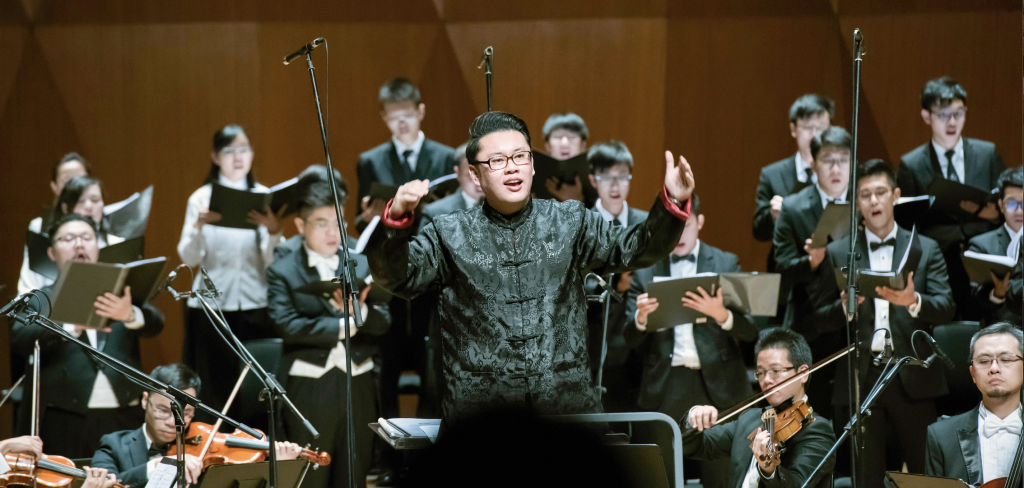At the age of 9, conductor and classical musician David Chin began his music education, unaware that it would one day serve as the foundation for an impactful international career in music education, conducting, translating and performance.
At 16, Chin first took a stab at conducting at his hometown church in Malaysia. When his pastor retired and needed someone to oversee the choir, Chin stepped into the position. He described it as a learning experience and a way to improve both his music and people skills.
Three years later, he departed his small town in Malaysia for America. He said God led him to Liberty University, where he studied choral and piano performance. He later taught there and at other universities as a professor.
Chin felt that moving to the West was necessary to fully immerse himself in his pursuit of Western classical music. A reason for his choice to study in America rather than Europe was the lack of a language barrier — he already spoke English as opposed to German or French.
Chin also noted the difficulty of promoting the performing arts, like sacred music, in Malaysia because many people just don’t feel the need for it.
Like most international students, Chin found America quite different from his home country. He learned that American citizens were much more expressive and individualistic. As an expressive and curious person himself, Chin felt more comfortable in America and other western countries.
Liberty drew Chin in not only because of its Christian teachings but also because of its students’ denominational diversity.
“I think that Christians should always find opportunity to really get to know people, especially those with very different views,” Chin said. “We should get to know people who are different from us, so that our minds, our thoughts, will be challenged.”
Before attending Liberty University, Chin earned an associate diploma in piano performance from Trinity College London in 2004, according to his website.
While at Liberty, the School of Music awarded Chin the “Outstanding Music Student of the Year” and “Outstanding Keyboard Student of the Year” awards upon graduation, according to his website. He directed two student choirs, won a concerto competition, performed a solo at the honors recital and graduated magna cum laude.
After completing his undergraduate degree at Liberty, Chin earned his master’s and doctorate degrees at the Eastman School of Music in Rochester, New York.
One of his first professional conducting projects took place in New York. Chin befriended a music director at a Lutheran church while working in New York after finishing his master’s degree. He decided to create a sacred music series at the church, forging his way through marketing, advertising, organizing and rehearsing.
The project was an amazing opportunity, he said. He also learned that while waiting for God-given opportunities is good, putting forth effort is equally important.
“In the Bible, God says to knock on the door, and the door shall be opened for you,” Chin said. “But the problem with many people is that they don’t even knock on the door. So, if you don’t knock on the door, even if the door was meant for you, it will not be opened.”
More recently, Chin created a documentary film about the 18th century German composer Johann Sebastian Bach called “Encountering Bach,” featuring several interviews with scholars about Bach and his compositions. Chin had worked with Bach’s music before, even performing pieces such as “St. Matthew’s Passion.”
Chin describes Bach as “a strong believer, a fine musician and a knowledgeable theologian.” He especially appreciates that Bach created high-quality music, never sacrificing his standards for money or for societal trends. Chin said he respects Bach’s history and his ability to make the most out of what God gave him.
In one instance, a Buddhist man who attended Chin’s performance of Bach’s “St. Matthew’s Passion” wrote a review saying he had underestimated the suffering of Christ on the cross. Even though the man was a different age, culture, race and creed, Bach’s music spoke to him.
Chin truly believes that music can connect all people.
“If you take away skin color, the cultural backgrounds, the food we eat and just look at raw human beings, we are really made the same,” Chin said. “We have the same sort of feelings of fear, longing, hope, desire, love, faith. … And I think music is the one art form that is able to connect all of those.”
The pandemic erased much of the normalcy that Chin had in his life. He has not been able to conduct a concert in the past two years. He said it has been difficult to be away from performing, labeling it as the feeling of “tak(ing) away the brush of a painter.”
Although he hopes to conduct a concert in-person soon, Chin knows that he must surrender his will to God.
“Prayer is not about changing God’s plan, but prayer is about changing our hearts to fit God’s plan,” Chin said.
He added that it’s something he’s still learning, and that it’s a lot easier said than done.
Currently, Chin is translating an internet database about Bach from German to Chinese to make Bach’s symphonies more accessible to people around the globe. He will be returning to Germany in April to continue his work there.
More information about Chin can be found at his website at www.davidchinmusic.com.
Bear is a feature reporter.
